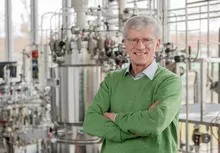Alumni

Former Chair of Bioprocess Engineering (until 2021)
Scientific focus
- selective fractionation and concentration of complex raw materials
- structure design in food
- bioprocess and biofunctionality
- analytical techniques for the characterization of food and bio-systems
References
Kulozik UM: “Structuring Dairy Products by Means of Processing and Matrix Design”. In: Food Materials Science – Principles and Practice. Editor: Aguilera JM, Lillford PJ. New York: Springer Science and Business Media, 2008 Abstract
Kulozik UM: “Verfahrenstechnik kontinuierlicher Fermentationen – dargestellt am Beispiel der Milchsäure- und Biomassegewinnung im Rohrfermenter“. Düsseldorf: Verlag des Vereins deutscher Ingenieure (VDI), 1992.Abstract
Kulozik UM: „Einflüsse auf die Permeation von Wasser und gelösten Stoffen sowie auf den Deckschichtabtrag bei der Umkehrosmose“. Düsseldorf: Verlag des Vereins deutscher Ingenieure (VDI), 1986.Abstract

Former Chair of Microbial Ecology (until 2021)
Director of ZIEL 2003-2014
Scientific focus
- Microbioal ecology
- Food safety research on the ecology of food borne pathogens, e.g. Escherichia coli (EHEC)
- Taxonomy and evolution: biodiversity of food borne microorganisms with focus on raw milk
References
link to full list
Landstorfer R, Simon S, Schober S, Keim D, Scherer S, Neuhaus K (2014) Comparison of strand-specific transcriptomes of enterohemorrhagic Escherichia coli O157:H7 EDL933 (EHEC) under eleven different environmental conditions including radish sprouts and cattle feces. BMC Genomics 15:353, DOI: 10.1186/1471-2164-15-353
von Neubeck M, Baur C, Krewinkel M, Stoeckel M, Kranz B, Stressler T, Fischer L, Hinrichs J, Scherer S, Wenning M (2015) Biodiversity of refrigerated raw milk microbiota and their enzymatic spoilage potential. Int J Food Microbiol 211:57-65
Neuhaus K, Landstorfer R, Simon S, Schober S, Wright P, Smith C, Backofen R, Wecko R, Keim D, Scherer S (2017) Differentiation of ncRNAs from small mRNAs in Escherichia coli O157:H7 EDL933 (EHEC) by combined RNAseq and RIBOseq – ryhB encodes the regulatory RNA RyhB and a peptide, RyhP. BMC Genomics 8:216 DOI: 10.1186/s12864-017-3586-9

Technische Universität München
Lehrstuhl für Biotechnologie der Nutztiere
TUM School of Life Sciences
Scientific focus
- development of genetically engineered pigs for translational research
- Genetic and epigenetic analysis
- Xenotransplantation
References
Flisikowska, T., Merkl, C., Landmann, T, Eser, S., Rezaei, N., Cui, X., Kurome, M., Zakhartchenko, V., Kessler, B., Wieland, H., Rottmann, O., Schmid, R.M., Schneider, G., Kind, A., Wolf, E., Saur, D. and Schnieke, A. (2012). A porcine model of familial adenomatous polyposis. Gastroenterology 143, 1173-1175.
Saalfrank, A., Janssen, K-P., Ravon, M., Flisikowski, K., Eser, S., Steiger, K., Flisikowska, T., Müller-Fliedner, P., Schulze, E., Brönner, C., Gnann, A., Kappe, E., Böhm, B., Schade, B., Certa, U., Saur, D., Esposito, I., Kind, A. and Schnieke. A. (2016). A porcine model of osteosarcoma. Oncogenesis 5, e210. doi: 10.1038/oncsis.2016.19.
Fischer, K., Kraner-Scheiber, S., Petersen, B., Rieblinger, B., Buermann, A., Flisikowska, T., Flisikowski, K., Christan, S., Edlinger, M., Baars, W., Kurome, M., Zakhartchenko, V., Kessler, B., Plotzki, E., Szczerbal, I., Switonski, M., Denner, J., Wolf, E., Schwinzer, R., Niemann, H., Kind A. and Schnieke A. (2016). Efficient production of multi-modified pigs for xenotransplantation by 'combineering', gene stacking and gene editing. Nature Scientific Reports 6, 29081 doi: 10.1038/srep29081.

Former Chair of intestinal Microbiome
current affiliation:
University of Birmingham
Chair of Microbiome Research
Institute of Microbiology and Infection
e-mail: l.hall.3@bham.ac.uk
Further information:
The Hall lab comprises a multi-disciplinary team that is seeking to understand the molecular aspects of microbiome interactions, at the interface of the gut mucosa. We have a particular focus on the early life developmental window, as pregnancy and infancy, and the microbes that colonise during this time (e.g. Bifidobacterium), coincides with key physiological programming, and is when the foundations of future health and wellbeing are laid down.
My labs research programme is organised into three complimentary themes (i) microbe-diet interactions, (ii) colonisation resistance, and (iii) microbiota-host crosstalk. These themes are interlinked by large longitudinal cohort studies, including a preterm infant cohort and a mother-infant dyad cohort. Our clinical studies (and clinical studies lead by other ZIEL members) underpin our wider research activities, which comprise a series of coordinated investigations addressing the mechanistic foundation of microbiome-host interactions in health and disease, with the aim of intervention and therapy development. We collaborate with other ZIEL members to leverage their significant expertise in different disciplines and their innovative model systems.
The lab utilises multi-disciplinary approaches and ZIEL core facilities to answer these key questions including; microbiology (in vitro model-colon systems for complex culturing, molecular microbiology, cultureomics), metabolomics (NMR, M/S), next generation sequencing (RNASeq, 16S rRNA, WGS, metagenomics; both host and microbe), bioinformatics tools, in vivo models (germ-free and infection models) and human studies (infants and adults).
Ehemalige Nachwuchsgruppen

Former Research Group Lipid Metabolism
current affiliation:
University of Regensburg
Functional Lipidomics and Metabolic Research
josef.ecker[at]ukr.de
Research:
Nature provides an enormous diversity of lipid molecules that originate from various pathways. Fatty acids are key modules for various lipids, including cell membrane lipids such as phospholipids or triacylglycerols, which are the major components of lipid droplets. Excess lipids or defects in lipid metabolism are associated with diseases such as metabolic syndrome. Lipids are either obtained from exogenous sources, i.e., diet, or from endogenous biosynthesis. Numerous cellular processes such as cell growth or differentiation relay on de novo synthesis of lipids primarily for cell membrane generation.
The research group “Lipid Metabolism” focuses on investigations of fatty acid and phospholipid biosynthesis. Kinetics and dynamics of lipid metabolic processes are of particular interest as well influencing factors including the gut microbiota and pathophysiological conditions. The independent research group is headed by the principal investigator Josef Ecker with expertise in mass spectrometry, molecular biology, mouse experiments and lipid metabolism.
Recent investigations of our work are summarized in the following article.
You can find a list of our publications here.

Microbial Bioinformatics
Dr. Ilias Lagkouvardos
University of Crete
School of Sciences
71003, Heraklion, Crete, Greece
Research:
Dr. Ilias Lagkouvardos is a microbial ecologist and data integration enthusiast who utilizes bioinformatic methods and tools to address questions related to microbial diversity and ecology in various environments. The primary focus of his research group is the elucidation of the role of distinct microbial compositions in human health and disease by means of sequencing of the versatile 16S rRNA gene. In addition, he explores microbial genomics and metagenomics sequences for insights into the functionality and dynamics of complex microbial communities.
One main line of research in the Lagkouvardos group is to utilize state-of-the-art methods and tools to build specialized analytical pipelines and thereby develop user-friendly bioinformatic solutions for public use. One example of such novel bioifnormatic tool is the IMNGS platform (www.imngs.org), a web database that automatically retrieves all publically available 16S rRNA gene amplicon sequences and processes them in a uniform and organized way. The group also released Rhea, a set of R scripts for the analysis of microbial profiles (lagkouvardos.github.io/Rhea/). Courses disseminating expert knowledge on sequence analysis and demonstrating the usability of these tools are organized regularly.
Selected publications:
- Lagkouvardos I, Fischer S, K¬umar N, and Clavel T. 2017. Rhea: a transparent and modular R pipeline for microbial profiling based on 16S rRNA gene amplicons. PeerJ 5:e2836.
- Lagkouvardos I, Joseph D, Kapfhammer M, Giritli S, Horn M, Haller D, and Clavel T. 2016. IMNGS: A comprehensive open resource of processed 16S rRNA microbial profiles for ecology and diversity studies. Sci Rep 6:33721.
- Lagkouvardos I, Pukall R, Abt B, Foesel BU, Meier-Kolthoff JP, Kumar N, Bresciani A, Martinez I, Just S, Ziegler C, Brugiroux S, Garzetti D, Wenning M, Bui TP, Wang J, Hugenholtz F, Plugge CM, Peterson DA, Hornef MW, Baines JF, Smidt H, Walter J, Kristiansen K, Nielsen HB, Haller D, Overmann J, Stecher B, and Clavel T. 2016. The Mouse Intestinal Bacterial Collection (miBC) provides host-specific insight into cultured diversity and functional potential of the gut microbiota. Nat Microbiol 1:16131.
- Lagkouvardos I, Klaring K, Heinzmann SS, Platz S, Scholz B, Engel KH, Schmitt-Kopplin P, Haller D, Rohn S, Skurk T, and Clavel T. 2015. Gut metabolites and bacterial community networks during a pilot intervention study with flaxseeds in healthy adult men. Mol Nutr Food Res 59:1614-1628.
- Lagkouvardos I, Weinmaier T, Lauro FM, Cavicchioli R, Rattei T, and Horn M. 2014. Integrating metagenomic and amplicon databases to resolve the phylogenetic and ecological diversity of the Chlamydiae. ISME J 8:115-125.
Former Research Group Chronobiology
current affiliation:
Dr. Silke Kiessling
Lecturer in Chronobiology
School of Biosciences,
University of Surrey, UK
s.kiessling(at)surrey.ac.uk
Project @ ZIEL:
Circadian control of microbial function in chronic intestinal inflammation
Disruption of intrinsic clocks, e.g. by mismatch of the external and internal daytime in shift worker, as well as microbiota dysbiosis promote the development of gastrointestinal diseases. This project examines whether the circadian clock controls daytime-dependent fluctuations of microbiota composition and function. Microbiota transfer from will test whether the loss of microbiota fluctuations plays a key role in the development of IBD. Enhancing the clock in an IBD-relevant mouse model will determine whether the circadian clock can be a target for future strategies to treat shift-work associated syndromes.

Former Research Functional Microbiome
current affiliation:
Prof. Dr. Thomas Clavel
Research Group Functional Microbiome
Institute of Medical Microbiology,
RWTH University Hospital, Aachen
Phone: +49 241 80-85523
tclaveluk[at]aachen.de